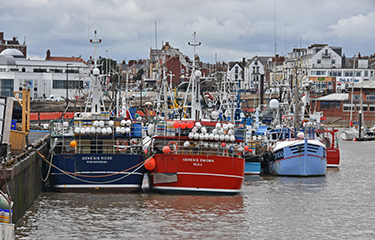Seafood businesses across the United Kingdom that have been affected by post-Brexit requirements for exporting to the European Union are now able to apply for financial support from the government, with up to GBP 23 million (USD 31.8 million, EUR 26.3 million) available through the new Seafood Disruption Support Scheme.
The countrywide fund, first announced on 19 January, will provide financial assistance to businesses that suffered a financial loss because of delays related to the export of fresh or live fish and shellfish to the E.U. during January.
The money will be paid retrospectively to cover losses incurred between 1 and 31 January, 2021.
Administered by the Marine Management Organisation (MMO) on behalf of Defra, the Seafood Disruption Support Scheme (SDSS) offers financial assistance based on a proportion of losses that can be verified up to a maximum of GBP 100,000 (USD 138,399, EUR 114,149) per business. The call for applications closes on 28 February, 2021, and, upon successful application, payments are expected to be issued in March.
U.K. Fisheries Minister Victoria Prentis said the scheme reflected “the unique challenges” faced by the sector. She added that the government would work closely with the fisheries and seafood industry through the Seafood Exports Working Group to troubleshoot any issues that cause delays to the export of highly perishable goods.
“While recognizing that huge efforts went into preparing for the required changes as we exited the E.U., there are many who have incurred losses through no fault of their own. The U.K. government is, therefore, stepping up with the Seafood Disruption Support Scheme,” Government Minister for Scotland David Duguid said. “I have been engaging with the industry for many months and continue to work with all sections of the seafood sector in Scotland as we move to maximize future opportunities and adapt to new rules.”
To qualify for the SDSS, businesses must be registered at Companies House or have evidence that they are a sole trader, partnership, or other legal entity, and must meet the following conditions: having fewer than 250 employees, an annual turnover of under GBP 36 million (USD 49.8 million, EUR 41.1 million), and less than GBP 18 million (USD 24.9 million, EUR 20.6 million) on their balance sheet.
Applicants must also be able to evidence the expected value of the consignment. Shipments affected by export rules that prevent the movement of goods to the E.U. will be outside the scope of the scheme.
The scheme's criteria has already faced heavy criticism, particularly from Scotland, with Fisheries Secretary Fergus Ewing insisting that the compensation scheme will not help the vast majority of fishing vessels.
“Just one example is the explicit exclusion of crab claws, which the U.K. government told companies they could not export – advice which was wrong and cost the industry a month in lost exports,” Ewing said. “This is not good enough and the U.K. government must urgently identify how they will support these businesses, and others who are caught up in the ongoing mess that Brexit has created.”
Ewing said that “as feared and predicted, the new trading relationship with the E.U. is having a catastrophic impact on Scotland’s food and drink export industry,” adding that the scheme only covers January, “when the reality is that access to markets in the E.U. will be permanently more difficult and more costly.”
Seafood Scotland Chief Executive Donna Fordyce also voiced her disappointment that many companies would be ineligible for support, saying that since 1 January, seafood exports have “slowed to a trickle” due to the new trade requirements, and that some businesses have for the time being “put their businesses on ice,” causing “great financial suffering” to their owners, staff, families, and communities.
“This includes companies that have simply had to stop trying because their product has not been getting through. Or, seafood businesses whose long-standing orders from customers in the E.U. have dried up because of the export crisis. Companies cannot produce health certificates and other documentation for orders never made because of a lack of customer confidence that product would reach the E.U. on time, and in peak condition,” Fordyce said. “It’s probable that these companies will never be fully compensated for what they have lost and are still losing, but the damage could still be limited if the systems were workable and export gets back on track quickly.”
Meanwhile, the newly-established Scottish Seafood Exports Task Force will meet for the first time this week, drawing together government officials and industry representatives from the catching, processing, and aquaculture sectors to drive forward the nation’s seafood sector.
At the same time, the government has created a GBP 100 million (USD 138.4 million, EUR 114.1 million) fund to help modernize fishing fleets and the fish processing industry, in addition to the GBP 32 million (USD 44.3 million, EUR 36.5 million) that will replace E.U. funding this year.
Photo courtesy of M Barratt/Shutterstock







